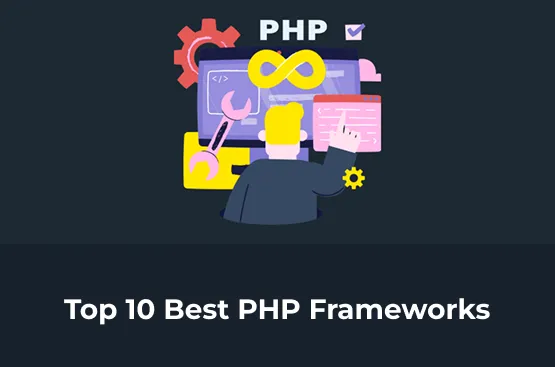
PHP remains one of the most popular server-side scripting languages for web development. However, building applications from scratch can be time-consuming and complex. That’s where PHP frameworks come in. They provide a structured, efficient, and secure way to develop web applications, helping developers speed up the development process.
In this blog, we’ll explore the top 10 PHP frameworks that can help you build scalable and high-performance web applications faster.
1. Laravel – The Most Popular PHP Framework
Why Choose Laravel?
Laravel is the most widely used PHP framework, known for its elegant syntax, built-in authentication, and extensive ecosystem. It simplifies web development with Eloquent ORM, Blade templating engine, and built-in support for API development.
Key Features:
✅ MVC architecture
✅ Artisan CLI (Command-line tool)
✅ Eloquent ORM for database management
✅ Built-in authentication and security
✅ API-friendly with Laravel Passport
Best For: Large-scale applications, enterprise projects, and API development.
2. Symfony – The Enterprise-Grade PHP Framework
Why Choose Symfony?
Symfony is a powerful, flexible, and high-performance framework used for complex enterprise applications. It follows PHP best practices and is widely adopted by businesses needing scalability.
Key Features:
✅ Modular component-based system
✅ Reusable bundles for faster development
✅ Robust debugging tools
✅ Twig templating engine
✅ Long-term support (LTS)
Best For: Enterprise applications, large-scale platforms, and projects requiring long-term support.
3. CodeIgniter – The Lightweight PHP Framework
Why Choose CodeIgniter?
CodeIgniter is a lightweight and fast framework, ideal for PHP developers who need a simple and hassle-free solution. It doesn’t require complex configurations and is perfect for beginners.
Key Features:
✅ Small footprint (~2MB)
✅ Excellent performance and speed
✅ Simple and clear documentation
✅ Built-in security and error handling
✅ No restrictive coding rules
Best For: Small to medium-sized web applications and performance-driven projects.
4. CakePHP – The Rapid Development Framework
Why Choose CakePHP?
CakePHP follows the convention over configuration principle, making development quick and efficient. It includes built-in security features and is easy to set up.
Key Features:
✅ Zero-configuration setup
✅ Built-in validation and security tools
✅ CRUD (Create, Read, Update, Delete) scaffolding
✅ Robust ORM for database management
Best For: Rapid application development and secure web apps.
5. WordPress – The Most Popular CMS with PHP Core
Though WordPress is primarily known as a CMS, it’s built on PHP and offers a robust framework for developing custom web applications.
Why Choose WordPress?
For content-driven websites, eCommerce stores (via WooCommerce), and blog-based applications, WordPress remains an excellent PHP-based framework with vast scalability.
Key Features:
✅ Thousands of themes and plugins for customization
✅ Built-in REST API for headless development
✅ Secure and SEO-friendly architecture
✅ Huge developer community and support
6. Zend Framework (Laminas) – Ideal for Complex Applications
Why Choose Laminas?
If you need a framework that supports long-term development with high customization, Zend/Laminas is a solid option.
Key Features:
✅ Modular architecture for flexibility
✅ Enterprise-level security features
✅ Support for APIs and web services
✅ Integration with third-party libraries
7. Phalcon – Blazing Fast Performance
Why Choose Phalcon?
If performance is your top priority, Phalcon’s speed and low overhead make it a fantastic option.
Key Features:
✅ Extremely fast execution time
✅ Low resource consumption
✅ Built-in caching and security features
✅ Full-stack framework with MVC architecture
8. FuelPHP – Flexible and Modular
Why Choose FuelPHP?
FuelPHP is ideal for developers who need a flexible framework that supports modern development practices.
Key Features:
✅ HMVC (Hierarchical Model-View-Controller) architecture
✅ Enhanced security features
✅ Modular structure for easy extension
✅ RESTful API support
9. Yii – High Performance and Secure
Why Choose Yii?
Yii is an excellent choice for web applications requiring high security and scalability, such as eCommerce platforms and CMS.
Key Features:
✅ Lazy loading for improved performance
✅ Strong security features like SQL injection prevention
✅ Integrated testing tools
✅ RESTful API development
10. Slim – Best for Microservices and APIs
Why Choose Yii?
Slim is a micro-framework designed for building APIs and lightweight applications.
If you’re building RESTful APIs or lightweight web apps, Slim is a great choice for speed and simplicity.
Key Features:
✅ Minimal footprint, perfect for microservices
✅ Built-in middleware support
✅ Fast routing and request handling
✅ PSR-7 support for handling HTTP requests